As the no. 1 cloud infrastructure partner, LG CNS leads clients' digital transformation(DX) through its unparalleled technology and extensive cross-industry experience. LG CNS' cloud infrastructure services deliver end-to-end infrastructure management across the IT lifecycle, including infrastructure SI (System Integration), SM (System Maintenance), optimization, and migration. Notably, it offers specialized infrastructure services, boasting deep expertise in areas such as AI infrastructure, Private/Hybrid Cloud, and Private 5G.


reflecting its vision to become the leading company in the 'New Infrastructure' sector,
encompassing AI infrastructure, Private/Hybrid Cloud, and Private 5G, going beyond traditional IT infrastructure.
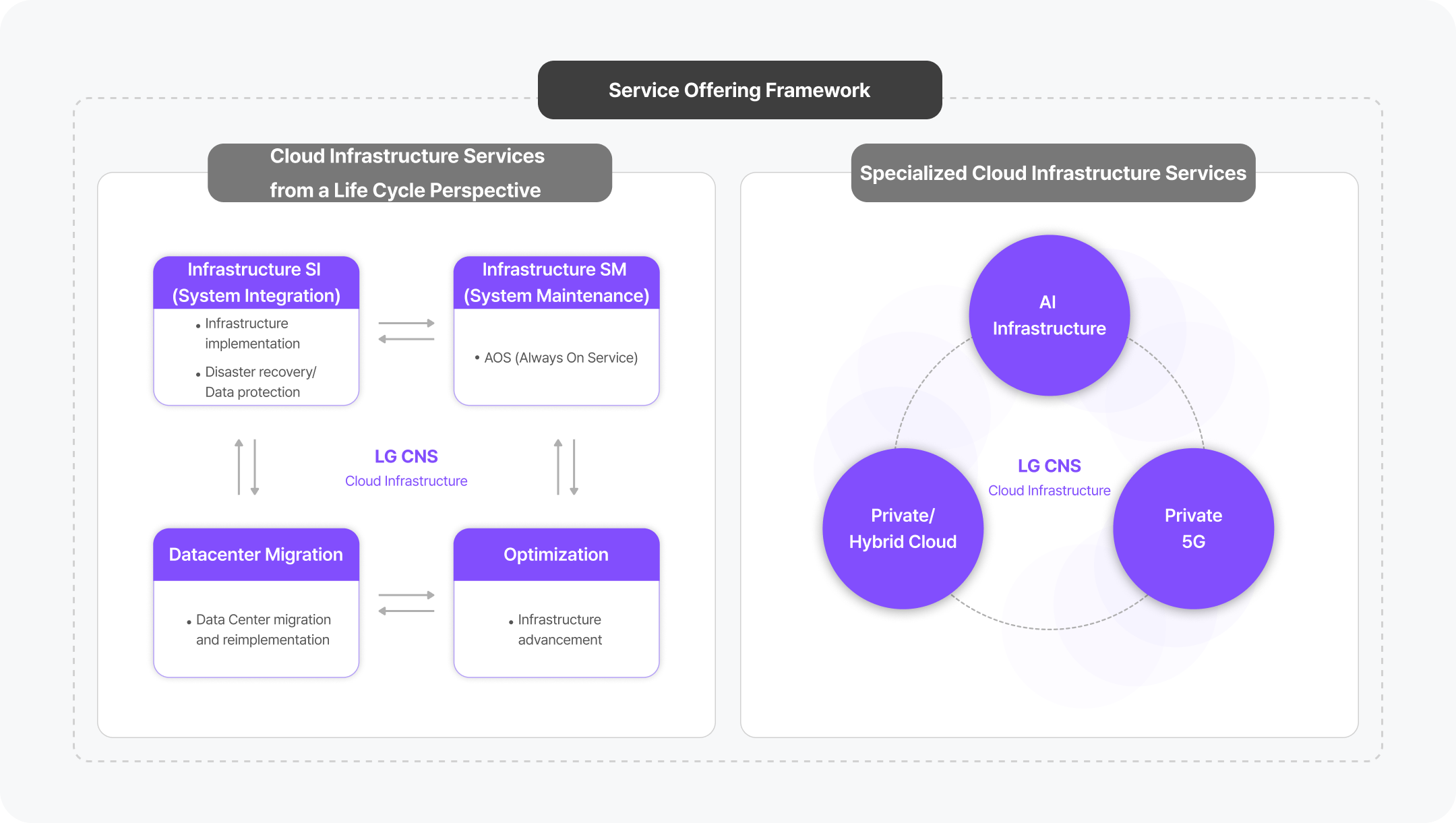


Scope of Services
With our accumulated expertise and extensive experience in cloud infrastructure, we support clients through every stage of their Infrastructure Journey, providing comprehensive, integrated infrastructure services from a holistic IT system lifecycle perspective. We specialize in our distinct cloud infrastructure domains, encompassing the "New Infrastructure," such as AI infrastructure, Private/Hybrid Cloud, and Private 5G.
Leveraging strategic partnerships with global tech leaders, coupled with our unparalleled capabilities in cloud infrastructure and a team of seasoned professionals with diverse project experience, we deliver optimal, customized services for our clients' IT infrastructure environments.
-
- Backed by one of the largest and most skilled teams of IT professionals in Korea's SI industry
- Operates a structured talent development program to nurture elite infrastructure specialists
-
- Proven best practices in infrastructure architecture tailored to the unique needs of various industries
- Rapid and reliable technical delivery powered by a comprehensive knowledge database
-
- Premium partnerships with a wide range of global vendors in IT infrastructure
- Continuous enhancement of technical support quality through adoption of emerging technologies
-
IT infrastructure is critical as it lays the foundation for a company's comprehensive digital transformation (DX) journey. Therefore, during infrastructure implementation or renewal, it's essential to consider various factors, including the objective selection of products and solutions, the application of the latest and optimal architecture, and the provider's ability to ensure seamless maintenance and technical support. Above all, it's crucial to verify the provider's technical expertise and capability to manage the entire lifecycle of the IT infrastructure domain, which encompasses a diverse mix of technologies.
-
On-premises infrastructure offers distinct advantages over cloud in terms of data security and control. Because data is stored and managed within the organization's internal systems, external network transmission is eliminated, thereby minimizing security risks. Particularly in compliance-critical industries such as finance and public sectors, an on-premises environment enables full enforcement of internal security policies. Furthermore, on-premises infrastructure provides advantages in data accessibility and disaster recovery management. While cloud solutions rely on providers for data storage and recovery, potentially causing accessibility issues or recovery delays, on-premises systems empower internal teams to directly manage incidents and design recovery protocols, thus minimizing downtime and guaranteeing data accessibility. Moreover, in environments where data sovereignty and emergency preparedness are critical, on-premises infrastructure offers considerable advantages.
-
On-premises infrastructure offers distinct advantages over cloud in terms of data security and control. Because data is stored and managed within the organization's internal systems, external network transmission is eliminated, thereby minimizing security risks. Particularly in compliance-critical industries such as finance and public sectors, an on-premises environment enables full enforcement of internal security policies. Furthermore, on-premises infrastructure provides advantages in data accessibility and disaster recovery management. While cloud solutions rely on providers for data storage and recovery, potentially causing accessibility issues or recovery delays, on-premises systems empower internal teams to directly manage incidents and design recovery protocols, thus minimizing downtime and guaranteeing data accessibility. Moreover, in environments where data sovereignty and emergency preparedness are critical, on-premises infrastructure offers considerable advantages.
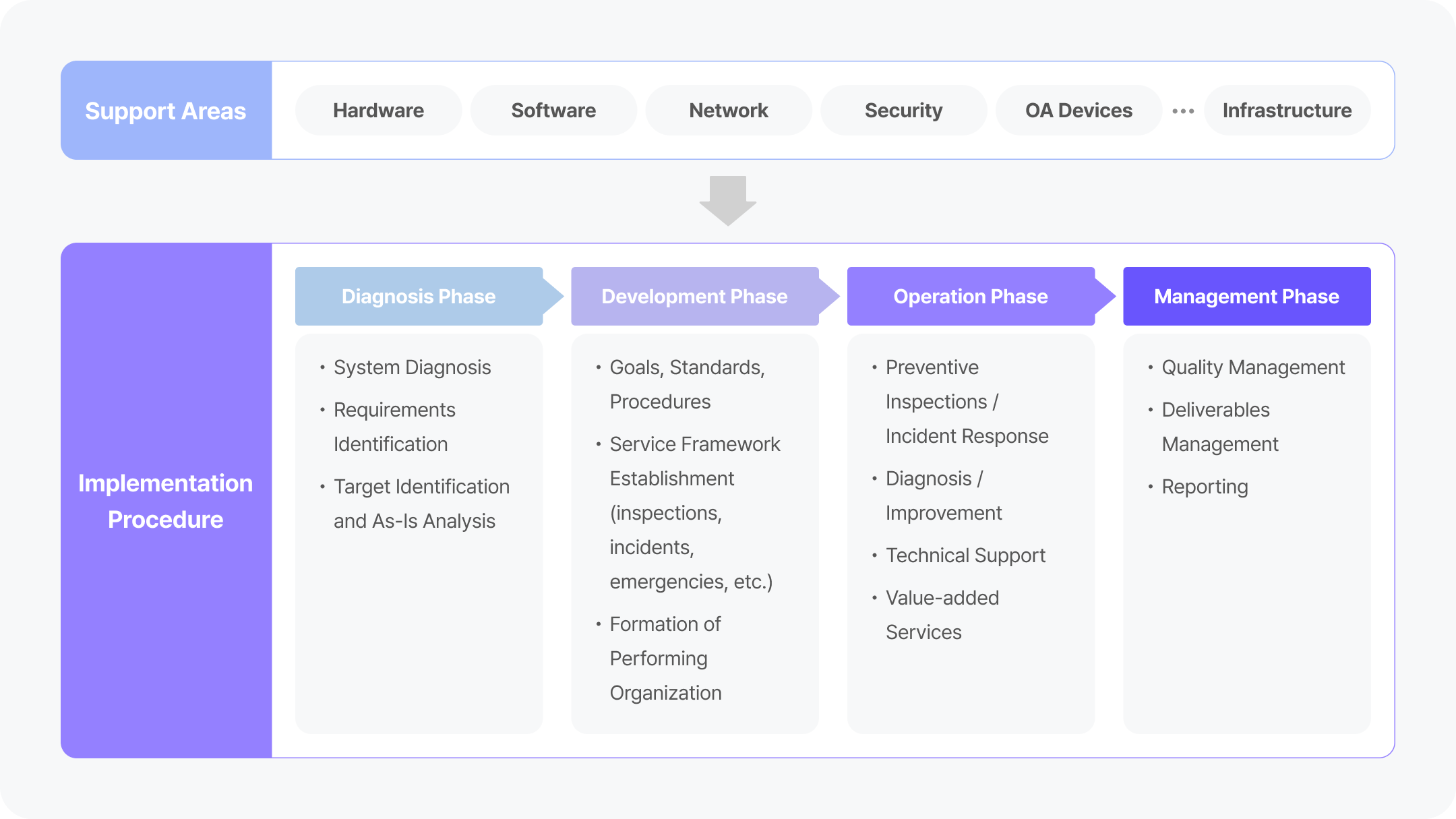
Scope of Services
LG CNS AOS provides integrated maintenance management services to improve the availability of various IT resources, from clients' hardware and software to infrastructure, and to establish a single point of contact for users and IT support teams.

Service Highlights
LG CNS AOS ensures operational stability and continuity with an integrated maintenance system proven across diverse industries, and enhances clients' operational efficiency through advanced services such as automated management tools and refined maintenance methodologies.

Why LG CNS
With extensive experience in integrated IT infrastructure maintenance, LG CNS' team of expert technicians, equipped with end-to-end execution capabilities, spanning IT infrastructure architecture design, implementation, operations, and maintenance, delivers services through technical support and organized response frameworks that align with clients' IT strategies.
Companies operating IT infrastructure adopt stable system deployments and non-disruptive architectures to ensure uninterrupted IT services and business continuity. However, as businesses scale, deployed IT infrastructure may undergo changes in system environments due to increased usage, service modifications, configuration adjustments, and obsolescence. LG CNS provides a suite of seven specialized services designed to ensure service stability and availability, minimize disruptions, and facilitate swift issue resolution.
-
Enhancing maintenance productivity and efficiency through integrated management services based on infrastructure asset data
-
Offers rack space management services for integrated infrastructure maintenance data centers, ensuring efficient installation management of equipment and up-to-date infrastructure management
-
Provides an automated specialized service to strengthen preventive inspection expertise while improving the quality and productivity of integrated maintenance infrastructure operations
-
Provides fast performance diagnostics and optimization for servers under integrated maintenance
-
Supports proactive monitoring and an advanced incident response system through integrated maintenance infrastructure control services
-
Maximizes efficiency of infrastructure operations personnel by automating operations and maintenance tasks for integrated maintenance infrastructure
-
Optimizes Help-Desk operations through analysis and diagnosis of the client’s IT support structure
-
Individual contracts with multiple maintenance providers can enhance the client's influence over each provider, but they also complicate contract management and often preclude cost savings from economies of scale. Critically, complex failures can lead to disputes between providers, undermining quality control. Conversely, integrated maintenance reduces the client's contract management burden and allows for cost savings through bulk discounts by leveraging the provider's buying power. Furthermore, it enables comprehensive quality control, facilitating process standardization, systematic Service Level Agreement (SLA) management, and effective resolution of complex failures.
-
To ensure quality and infrastructure operational stability for successful maintenance implementation, consider these factors:
- The provider has extensive experience in similar projects.
- The implementation is driven by an integrated management process or methodology.
- Specialized tools and solutions are used for systematic management.
- The provider demonstrates expert technical capabilities with products and solutions from various global vendors.
- There are proven enterprise-wide emergency response capabilities.
- The provider avoids over-prioritizing cost reduction at the expense of operational quality.
- The provider adheres to subcontracting prohibition regulations.
- The provider manages partner performance through direct contracts in compliance with service execution quality management.
-
LG CNS' integrated maintenance service, AOS (Always On Service), establishes a clear management direction by analyzing client infrastructure and provides a professional management framework with differentiated services. AOS advances integrated maintenance management by enhancing productivity and cost efficiency to ensure top-tier service quality and client satisfaction. We offer three service tiers—Basic, Advanced, and Premium—to meet diverse client needs, with the Basic tier serving as a foundation for customizable service quality enhancements. Finally, LG CNS' extensive expertise—including a deep technical understanding of diverse infrastructure architectures, thorough knowledge of operations and maintenance processes, and best-practice-driven service quality improvement—results in stable implementation and widely recognized, high-quality maintenance services.
Powered by Global Tech Partnerships and AI Project Expertise
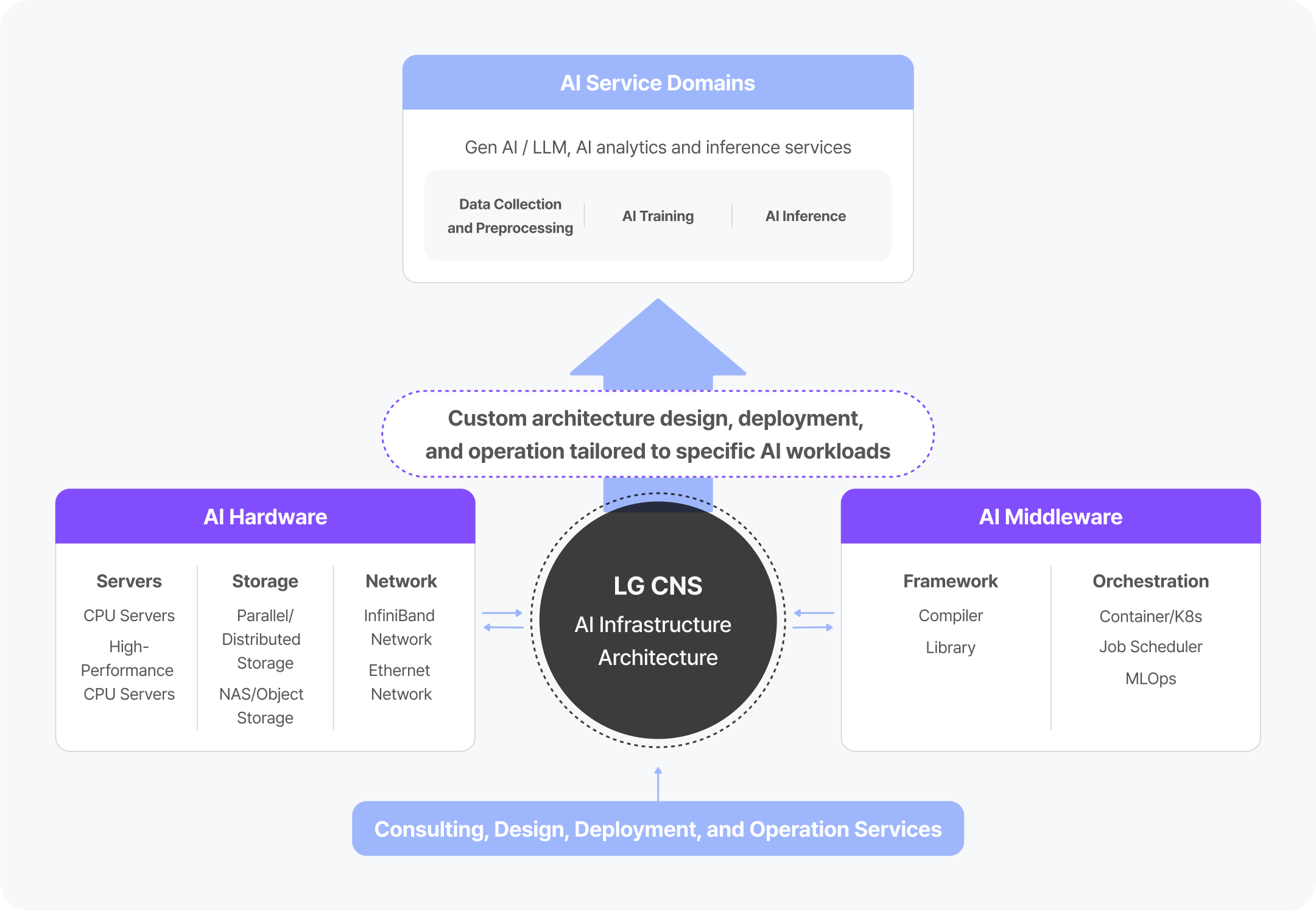
Scope of Services
With a team of dedicated AI engineers, we design and implement optimal
architectures to meet specific client requirements and provide a comprehensive AI infrastructure ("Full Lifecycle Service") that includes specialized AI operations support.
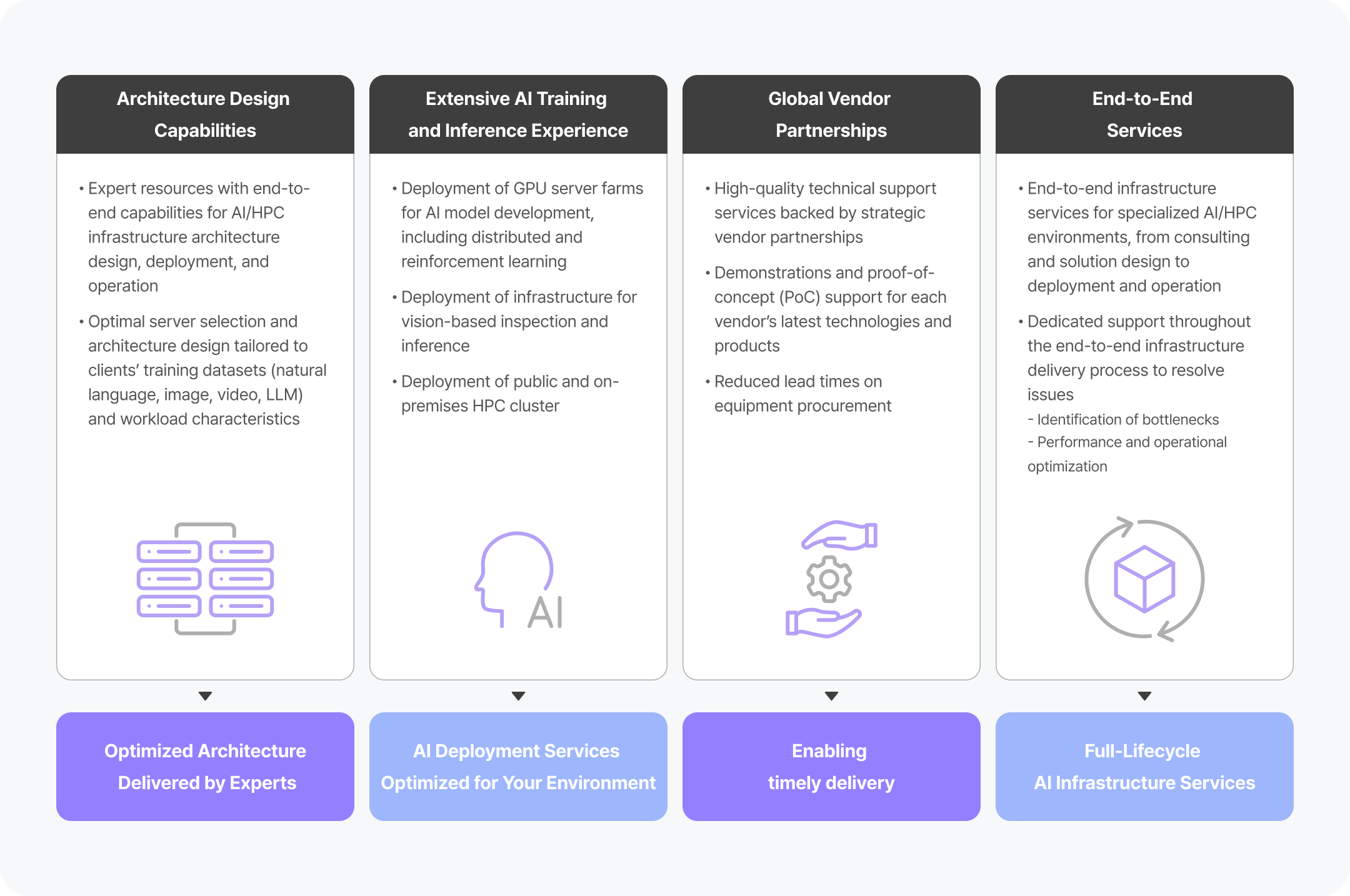
Key Service Benefits
We leverage our deep AI infrastructure expertise and extensive experience to design and implement architectures that deliver optimal performance at optimal costs, aligned with client timelines.
-
When implementing AI infrastructure, companies often debate whether cloud-based, on-premises, or hybrid solutions is the most suitable choice. For sensitive data or stringent compliance requirements, on-premises or hybrid approaches are typically preferred. When prioritizing flexibility and scalability, companies often choose cloud-based infrastructure. For AI applications requiring dedicated resources, on-premises deployments can be more cost-effective, while hybrid solutions provide a balanced option by managing sensitive data and optimizing costs.
-
First, identify the root cause of the performance issues. Common causes include insufficient GPU or CPU resources and system bottlenecks. Handling large datasets or training complex models can exacerbate resource limitations, leading to performance degradation. Additionally, network latency and suboptimal software configurations (e.g., CUDA version compatibility) during training or inference can contribute. Even with adequate hardware, inefficient resource allocation or scheduling may hinder performance, highlighting the need for optimized architecture design and tailored solutions.
-
Corporate clients may encounter inefficiencies when purchasing independent infrastructure for each task. Instead, consider designing a scalable, integrated GPU cluster architecture to form a distributed environment. This approach enables optimized investments, efficient operations, and enhanced performance.
Providing Ultra-Fast, Ultra-Low Latency, and Hyperconnectivity Solutions
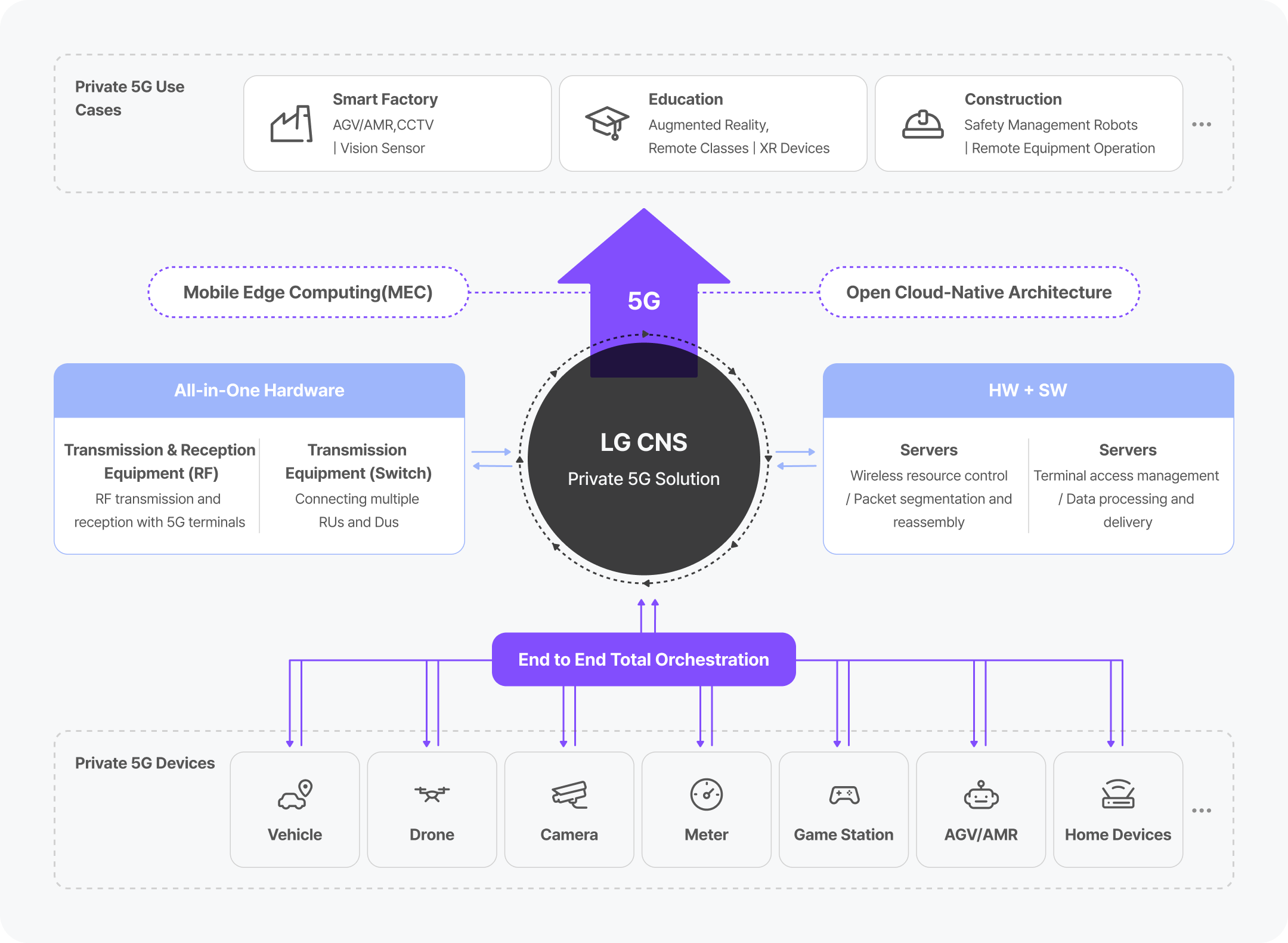
Scope of Services
We deliver optimized Private 5G Core and CU/DU solutions tailored for specialized network deployment. Our comprehensive management solutions ensure seamless control and streamlined operations from client devices to the entire 5G network infrastructure.
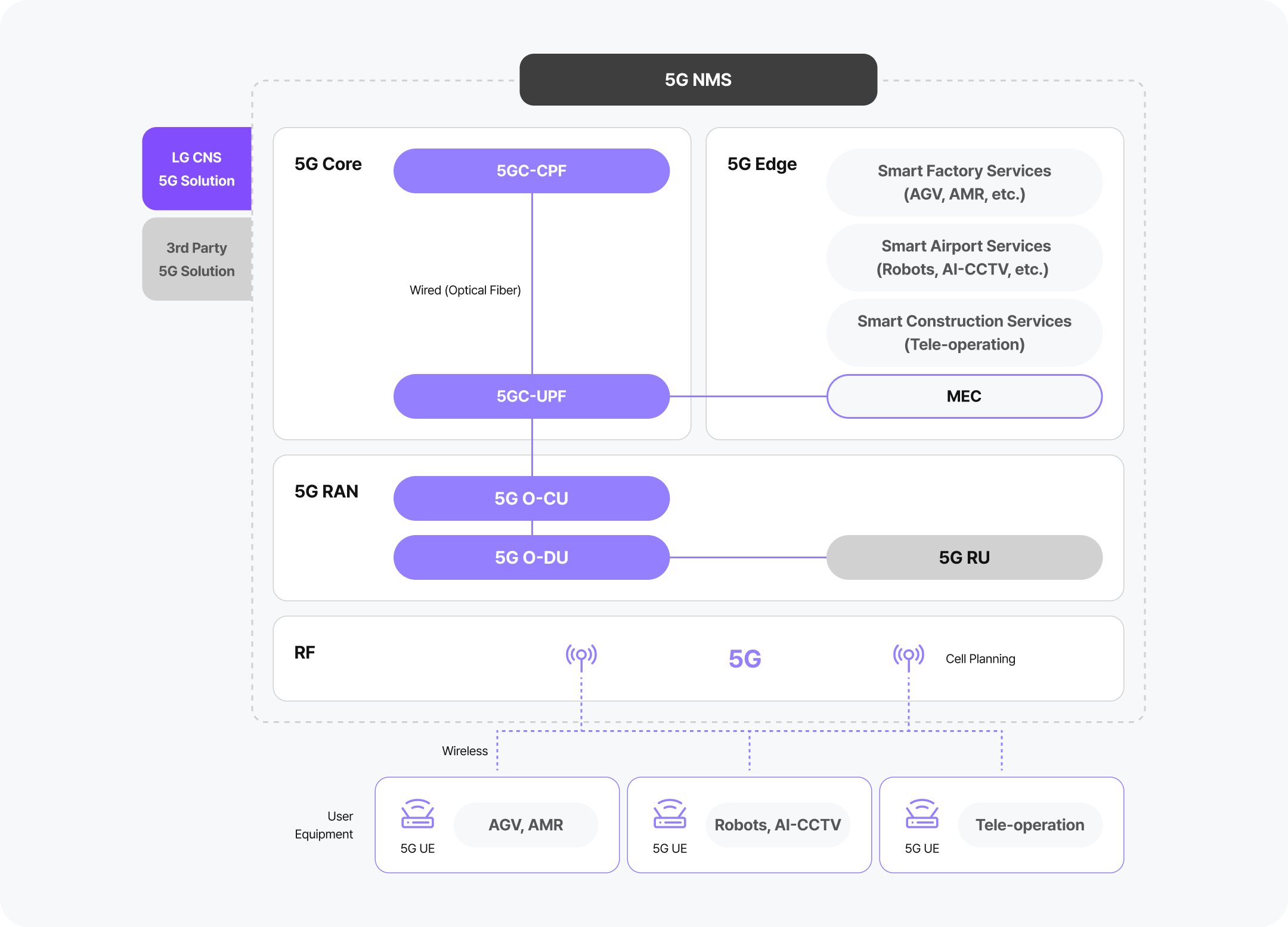
Solution Strengths
As a licensed Private 5G operator, we deploy 5G-specialized networks with advanced eUM (enhanced Ultra-Reliable Low Latency Communications) capabilities, leveraging a validated, cloud-native 5G Core solution and an open 5G CU/DU solution.
- As a ready Private 5G operator, we ensure unparalleled reliability with extensive industry experience and technical proficiency, offering eUM capabilities supported by robust solution development and validation.
- We offer efficient deployment strategies encompassing consulting, deployment, and operation, delivering integrated services rooted in our expertise in Private 5G solution development and our capabilities as a leading solution and SI provider.
-
End-to-End Private 5G Consulting, Deployment, and Operations with Optimized Implementation Strategies
-
A Total Service Provider Backed by Private 5G Solution Development and System Integration Expertise
-
Extensive Industry Experience Across Public, Education, and Manufacturing Sectors, Including Large-Scale Project Delivery
-
A Private 5G network is a customized communication system, distinct from public mobile networks, built and operated within a specific area—buildings, facilities, and sites—using dedicated frequencies. This allows enterprises and institutions to establish an independent network isolated from the public Internet, enhancing security by allowing data access only to internal users without the risk of external breaches. Private 5G networks enable wireless connectivity for small devices and equipment, providing seamless mobility, expanded coverage, and reliable connections. This facilitates uninterrupted connectivity for mobile devices like factory robots and drones, and supports real-time data transmission and control for applications such as robotics and autonomous vehicles.
-
Private 5G deployment offers significant advantages across various sectors, particularly in manufacturing, logistics, and transportation. The manufacturing industry is expected to be a primary beneficiary. Private 5G networks enable seamless communication between automated equipment (e.g., AGVs and AMRs) and industrial robots in smart factories, boosting productivity and efficiency. Additionally, advanced capabilities like predictive maintenance facilitate early detection of machine failures, reducing downtime and maintenance costs.
with Expert Technology and Experience
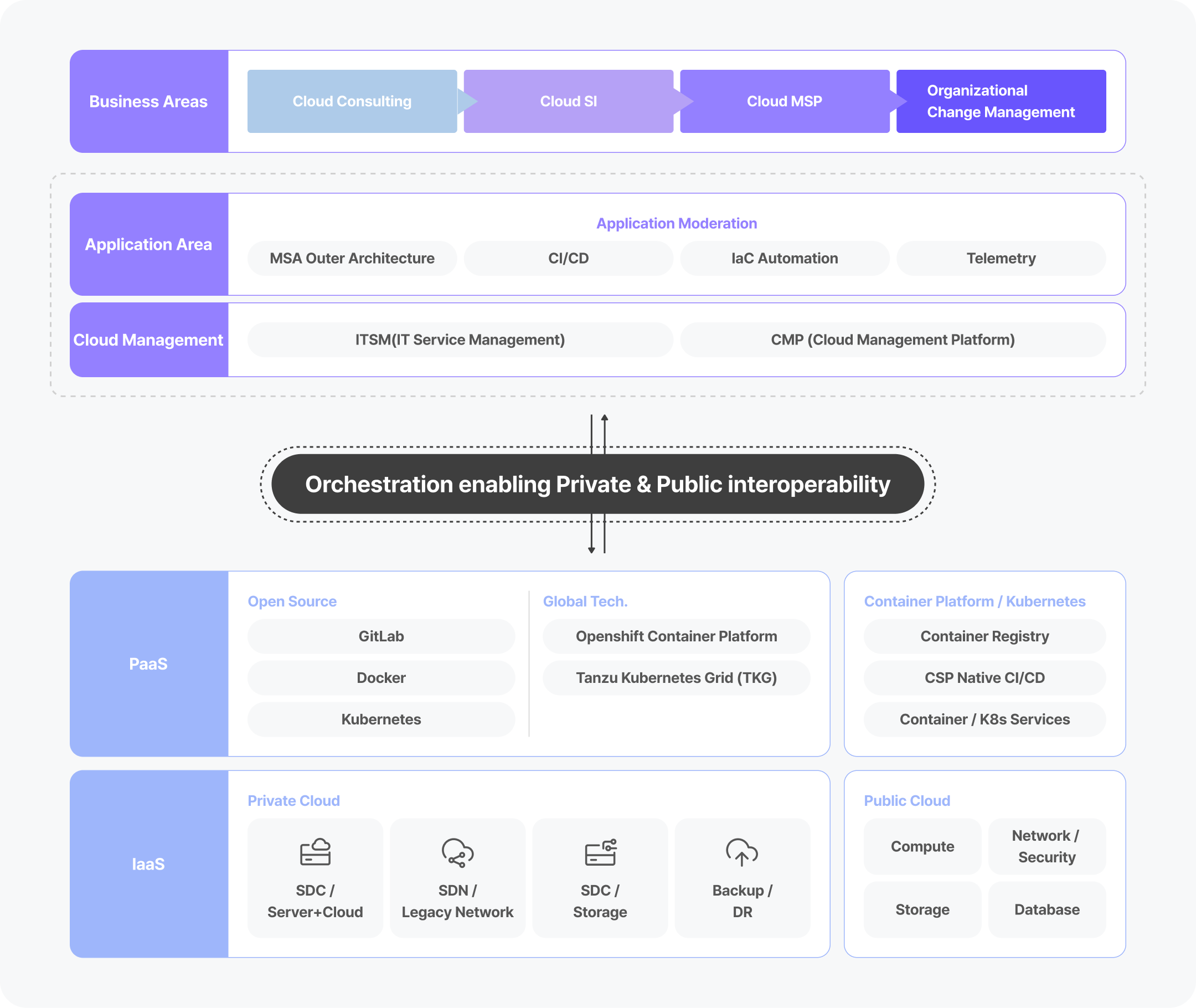
Scope of Services
We provide comprehensive lifecycle services for private/hybrid cloud infrastructure, including ISP consulting and diagnostics, infrastructure deployment, SM technical support, and organizational change management. We ensure security, scalability, and agility to meet rapidly evolving market demands.

Service Highlights
Leveraging extensive experience in private/hybrid cloud projects, strong partnerships with global tech companies and cloud service providers, and deep cloud technology expertise across all domains, we deliver forward-thinking cloud infrastructure architectures tailored to our clients' needs.
-
When adopting private/hybrid cloud, companies should carefully weigh various factors to achieve an optimal balance between security, flexibility, and cost-effectiveness. Data security is the most critical factor in private/hybrid cloud deployments. Organizations handling sensitive data, such as financial and healthcare institutions, must adhere to stringent regulations. Therefore, evaluating the ability to secure critical data and workloads in a private environment while ensuring scalability and flexibility in the public domain is essential. In the private/hybrid model, companies must strike the right balance between scalability and flexibility. While the public domain offers on-demand resource expansion, the private domain should also provide flexible resource allocation and management. Cost-effectiveness is crucial, as both initial deployment and operational expenses must be considered. Implementing usage-based pricing models and resource optimization strategies is key to ensuring scalability and flexibility in the public domain without incurring excessive costs.
-
While hybrid cloud adoption presents numerous challenges, security and complexity are the most significant hurdles. Transferring data between on-premises and public cloud environments increases the risk of external exposure, requiring a cautious approach, especially when handling sensitive or regulated data. Implementing robust security policies, including data encryption and access control, is essential. Network security is also critical. Security tools like firewalls and VPNs are necessary to prevent hacking or data leaks along communication pathways between on-premises and cloud environments.
Hybrid cloud deployments significantly increase technical complexity due to the simultaneous operation of on-premises and public cloud infrastructures. Seamless integration and management of these diverse environments can be challenging. Thus, standardizing data formats and storage methods is crucial for maintaining consistency. Operational complexity also rises, necessitating enhanced operator capabilities and the implementation of integrated management tools.
Unexpected cost increases are another significant challenge. Managing costs can become difficult due to the simultaneous occurrence of public cloud usage-based billing and on-premises infrastructure expenses. Therefore, real-time tracking of usage and costs through cost monitoring tools is essential. -
Hybrid cloud architecture is predominantly used in the financial sector. The inherent characteristics of financial data and operations, involving accounting and monetary transactions, require stringent security measures and flexible B2C service environments to meet customer demands. Additionally, the manufacturing sector is increasingly adopting hybrid cloud solutions due to growing security requirements.








